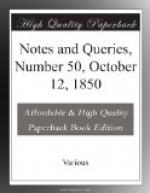Trogus Pompeius.—In Hannay and Dietrichsen’s Almanuck for the Year 1849, I find the following statement under the head of “Remarkable Occurrences of the Year 1847:”—
“July 21. A portion
of the history of Trogus Pompeius (the
author abridged by Justin)
is discovered in the library of
Ossolinski at Berlin.”
Not having noticed any contemporary account of this occurrence, I should be glad of any information respecting the nature and extent of the discovery.
E.L.N.
Mortuary Stanzas.—Could any of your readers supply me with information respecting the practice of appending mortuary stanzas to the yearly bills of mortality, published in many parishes; whether there are any extant specimens of such stanzas besides those memorable poems of Cowper written for the parish clerk of Northampton; and whether, also, the practice is still kept up in any parts of the country?
[Greek: Philopatris].
Laird of Grant.—In the north of England, I have repeatedly heard the auld wife remark, on observing any unwonted act of extravagance, such as burning more than the ordinary number of candles, &c. &c.,—“Who is to be Laird of Grant next year?” As this saying appears to be used only in the north, I have no other medium at present than to seek a reply through the aid of your valuable little work.
SENEX.
[A similar “saw”
was formerly current in the metropolis,—“What,
three candles burning! we
shall be Lord Mayor next year.”]
Bastille, MS. Records of.—Are there amongst the MSS. of the British Museum any documents relating to spies, or political agents, employed by the French and English governments from 1643 to 1715, who were incarcerated in the Bastille?
M.V.
Orkney under the Norwegians.—Torfaeus (Orcades), under the transactions of the year 1430 (p. 182-3.), has an incidental mention of the Orkneys as among the forbidden islands, “vetitae insulas,” of which the commerce was forbidden to strangers, and confined to the mother country, as to this day it is with Denmark and her possessions of the Faroe Islands and Iceland, both mentioned in the paragraph of the historian among the islands whose commerce was restricted. It would be very desirable to know of the social state of Orkney under the government of Norway and its native Jarls of the Norwegian race, and or its connexion with Norway and Denmark; and some of your correspondents may take the trouble to point out sources of information on the subject of this Query.
W.H.F.
Kirkwall
Swift’s Works.—In Wilde’s Closing Years of Dean Swift’s Life (2d edit. p. 78.) is mentioned an autograph letter from Sir Walter Scott to C.G. Gavelin, Esq., of Dublin, in the MS. library. T.C.D., in which he states he had nothing whatever to do with the publication or revision of the second edition of the Works of Jonathan Swift. This does not agree with the statement given in Mr. Lockhart’s Life of Sir Walter Scott, 2d edit. vol. vii. p. 215. Who was the editor, and in what does the second edition differ from the first?




